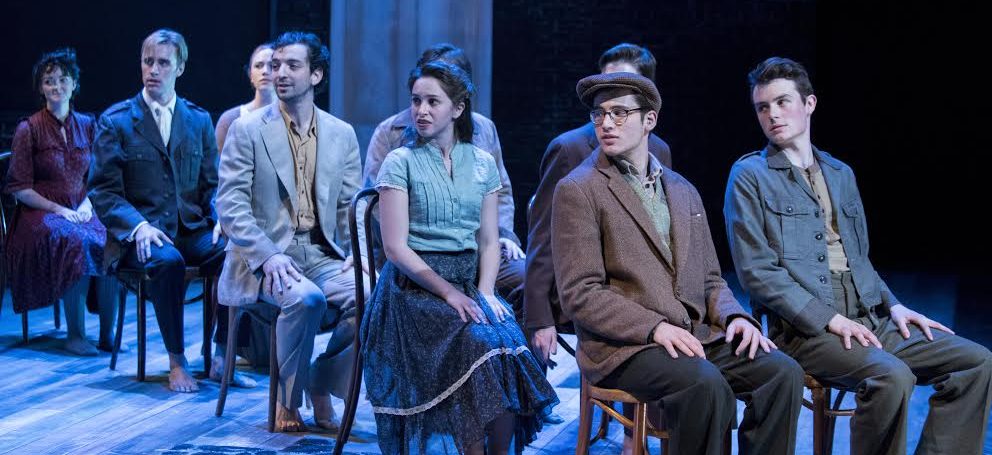Throughout Professor Derek Goldman’s adaptation of the acclaimed Polish play Our Class, actors turn to the audience and ask a simple question: “What was I supposed to do?” This query is at the heart of the complicated production that follows, as the play forces audiences to grapple with the devastating effects of mistrust and hate. Our Class is not an easy show to watch, but it is immensely powerful and leaves viewers reflecting on difficult questions without clear answers.
The play follows ten classmates, some Catholic and some Jewish, in a small village in Poland from 1925 through the present. In this ninety-year period, the audience sees Poland invaded by both the Soviets and the Nazis and watch the rise of anti-semitism that culminates in the massacre of hundreds of Jews in a barn on a hot day in July 1941. When the war ends, the violence lingers, and the show investigates the critical process of reckoning with the horrific aftermath of the Holocaust.
One of the many difficult concepts presented in Our Class is the tension between our notions of morality and reality. According to Goldman, this dissonance is part of what makes the play so taxing for audiences.
“It’s not a play with heroes and villains. It’s a play where we really watch a process of normal people who are friends and classmates, and how a societal and sociopolitical process turns them against each other,” Goldman said in an interview with the Voice. “It’s actually harder for the audience to digest.”
In Our Class, the audience meets and falls in love with the schoolchildren, and then watches them murder, rape, and betray one another. No character’s story arc is as heartbreaking as that of Rysiek (Colum Goebelbecker, COL ‘21). Goebelbecker is riveting as he transforms onstage from an eager, friendly child into a bloodthirsty monster jaded by his encounters with the Soviet military. His role is demanding, requiring him to perform unspeakable acts of violence onstage in front of a live audience. He handles it like a professional actor rather than a college student. Even at moments when Rysiek’s rage is almost too terrifying to watch, Goebelbecker makes it impossible to turn away.
If Rysiek was a difficult character to watch, the process of portraying him must have been excruciating. An issue at the center of Our Class was the health of the actors, a concern Goldman kept in mind.
“I knew it was going to be really demanding of our student actors because it’s so intense…This cast has been so generous, courageous, vulnerable, dedicated, holding each other up. They’ve risen to occasion far more than I ever imagined possible, often at real personal cost,” Goldman said.
The sacrifice that the cast put into the play was evident, as many actors gave moving performances. In his first production at Georgetown, Benjamin Eneman (COL ‘21) is a high point of the show with his beautiful portrayal of Abram, a Jewish student who actually leaves Poland at the beginning of the play to make his future in America. As viewers watch Abram grapple with the horror in Poland from afar, Eneman’s earnest, open-hearted demeanor is a speckle of hope in a plot shrouded by darkness. From the beginning to the very end, Eneman is incredible, striking the perfect balance of optimism and anger as he processes the massacre in his hometown. His performance will stay with you long after you leave the theater.
Where Eneman excels in his optimism, Marylouise Sparrow (SFS ‘19) is equally impressive in her pessimism. Portraying Zocha, a Polish student who hides a Jewish classmate in her hayloft, Sparrow is not a shining hero who always chooses to do the right thing even as her peers descend into violence. Though she takes in a Jew at great personal cost, she also stands by and fails to intervene when other classmates are in danger. She’s sarcastic and crass, but most importantly, she’s efficient in the way she processes trauma and moves forward. Sparrow is a good balance of witty and honest, occasionally letting her guard down to show cracks in Zocha’s armor.
Sparrow is also one of the first to turn to the audience and ask, “What was I supposed to do?” It is a query followed by a moment of silence as the audience collectively inhales, wondering if we would have behaved any differently in Zocha’s position.
“There isn’t an easy answer to that question,” Goldman said. “It puts us in the uncomfortable position of not having easy answers.”
Our Class handles difficult material, sometimes not in the best way. There are moments of violence that could be handled with more sensitivity, and graphic, disturbing scenes that feel unnecessary. Content warnings for the show are placed on the doors to the Gonda, and the program contains a note advising the audience that Our Class handles intense material. These are important and helpful measures, but cannot fully prepare anyone for what follows. The sexual violence in the play is extreme and graphic, and potential viewers who are at all sensitive to issues of sexual assault should be wary of these moments.
Despite its faults, Our Class brings up issues of factionalism, distrust, and hatred that are still relevant today. The play leaves viewers with more questions than answers, but the things it leaves us wondering about are what makes Our Class so important.
“I think of theater as very much a call and response. Yes, it’s responding to historical events, but it’s also responding to what’s in the air now,” Goldman said. “Theater is not just an end and a ‘hope you liked it.’ It’s a call for dialogue and engagement. My deepest hope is that it opens up a chapter of history that can be useful and instructive to us.”
The show will run this weekend, Nov. 15-Nov. 17 at 8 P.M. More information can be found here.







